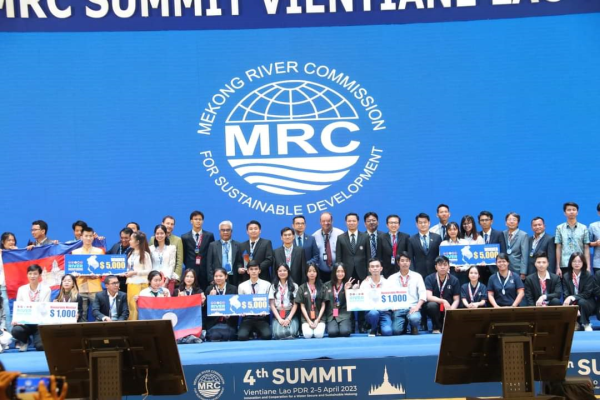KPL
(KPL) Students of the Faculty of Engineering Department of Computer Science and Information Technology, National University of Laos, has won “Soil Moisture Measurement” award at Mekong River Commission (MRC) River Monitoring Technology Competition.

(KPL) Students of the Faculty of Engineering Department of Computer Science and Information Technology, National University of Laos, has won “Soil Moisture Measurement” award at Mekong River Commission (MRC) River Monitoring Technology Competition.
The award ceremony for the competition was held at the National Convention Centre, Vientiane, Lao PDR on Apr 3.
The competition was attended by 14 teams from four countries: Laos, Thailand, Vietnam and Cambodia. The teams competed in four categories namely Soil Moisture, Water Level, Rainfall, and Water Quality.
Mr Phonepaseuth Sisaykeo, a member of the winning team, said, “We realized the importance of soil along the Mekong riverbanks and the problems that are likely to happen so we chose the topic of soil moisture and thought of inventing this innovative device. The project began in October 2022. Once we were selected as a representative from Laos, we participated in MRC Pitching Workshop in Bangkok, Thailand in January 2023. After returning from Bangkok we began inventing our innovation and presented it at the Mekong River Commission Secretariat on March 30-31, 2023, and we won the first price of the Soil Moisture category.”
Inventions of all the 11 participating teams are being displayed at the Lao National Convention Centre, where the 4th MRC Summit is taking place (April 2-5).
MRC, an intergovernmental organisation established in 1995 following the Mekong Agreement among Cambodia, Laos, Thailand, and Vietnam, serves as a regional platform for Mekong-related cooperation and knowledge sharing.
The MRC is currently running about 250 monitoring stations for factors affecting Southeast Asia's largest river such as hydrology, rainfall, water quality, ecological health, fisheries, and drought. However, most of their monitoring technologies rely on imported equipment, which is often expensive and sometimes outdated.
KPL